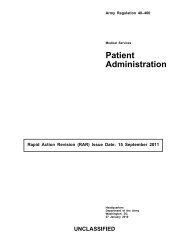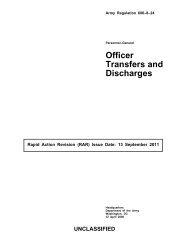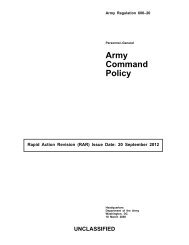Care and Disposition of Remains - Army Publishing Directorate ...
Care and Disposition of Remains - Army Publishing Directorate ...
Care and Disposition of Remains - Army Publishing Directorate ...
You also want an ePaper? Increase the reach of your titles
YUMPU automatically turns print PDFs into web optimized ePapers that Google loves.
The relinquishing PERE may not name the successor PERE. The successor PERE will be the next person in the order<br />
<strong>of</strong> priority.<br />
19–4. Challenges <strong>and</strong> disqualifications <strong>of</strong> the PERE<br />
Other relative’s <strong>of</strong> the decedent or interested persons may challenge the PERE’s qualification based upon family<br />
relationship, PERE’s incompetence, or civil law. The burden <strong>of</strong> pro<strong>of</strong> to establish that the PERE is not qualified<br />
generally rests with the person alleging the PERE is unqualified. Accordingly, the person challenging the PERE’s<br />
qualification will obtain <strong>and</strong> submit the documents required to disqualify the PERE.<br />
a. Spouse not properly married. A person listed as the deceased or missing person’s spouse in the <strong>of</strong>ficial military<br />
or civilian personnel record <strong>and</strong> verified by information in the Defense Eligibility Enrollment System (DEERS) is<br />
presumed to be prima facie valid. Final divorce or annulment decrees issued by a civil court are required to disqualify a<br />
spouse as the PERE. Separation agreements are not divorce or annulment decrees <strong>and</strong> therefore, insufficient to<br />
disqualify a spouse.<br />
b. Criminal allegations. Allegations, pending criminal charges, or indictments that the PERE murdered or otherwise<br />
caused the death <strong>of</strong> the decedent are insufficient to disqualify the PERE. A civil or military court conviction is required<br />
to disqualify the PERE.<br />
c. Age. Allegations that the PERE has misrepresented his or her age are resolved by the PERE verifying his or her<br />
age by presenting an <strong>of</strong>ficial civil document, such as a State issued birth certificate, State issued driver’s license, U.S.<br />
immigration <strong>and</strong> naturalization documents, <strong>and</strong> so forth. Documents issued by activities other than Federal or State<br />
governmental agencies are insufficient to establish a person’s proper age.<br />
d. Mental, medical, or physical incompetence. Allegations that the PERE is mentally, medically, or physically<br />
incompetent to receive the PE must be proved by civil court decree or medical certificate <strong>of</strong> incompetence issued by<br />
Federal or State licensed physicians or licensed mental health practitioners. The PE should not knowingly be delivered<br />
to a recipient who has been declared incompetent if there is another person eligible within the same class who is<br />
eligible to receive the PE. When no other eligible recipient exists within the same class <strong>and</strong> a legal representative has<br />
not been appointed, the PE must be delivered to an incompetent person, they will be delivered in care <strong>of</strong> the guardian<br />
<strong>of</strong> that person.<br />
e. Legal custody while the decedent was still a minor. Allegations that the PERE did not have legal custody while<br />
the decedent was a minor must be proved by a civil court decree terminating the PERE’s parental rights or a civil court<br />
decree awarding legal custody to another person. Civil court decrees awarding only physical custody are not legal<br />
custody decrees.<br />
f. Civil court order. The <strong>Army</strong> will comply with a civil court order providing control or custody <strong>of</strong> the PE to a<br />
person other than the PERE for the purpose <strong>of</strong> disposition.<br />
19–5. Order <strong>of</strong> precedence<br />
The order <strong>of</strong> precedence <strong>of</strong> persons to be designated as the PERE <strong>of</strong> deceased or missing personnel:<br />
a. Legal representative has the first precedence (see para 19–6)<br />
b. Spouse has the second precedence (see para 19–7).<br />
c. Child has the third precedence (see para 19–8)<br />
d. A parent has the fourth precedence (see para 19–9).<br />
e. Sibling has the fifth precedence (see para 19–10).<br />
f. Other blood relative has the sixth precedence (see para 19–11).<br />
g. A person st<strong>and</strong>ing in loco parentis has the seventh precedence (see para 19–12).<br />
h. A person named as a beneficiary in the will has the eighth precedence (see para 19–13).<br />
19–6. Legal representative<br />
Legal representative means a duly appointed executor or administrator to the deceased or missing person’s estate.<br />
a. Qualification. To qualify as a legal representative, an individual must present duly certified copies <strong>of</strong> letters<br />
testamentary, letters <strong>of</strong> administration, or other evidence <strong>of</strong> final qualification, issued by a proper court <strong>of</strong> competent<br />
jurisdiction. The SCMO need not inquire into the jurisdiction <strong>of</strong> the appointing court; the letters are prima facie<br />
evidence <strong>of</strong> the holder’s qualification. An individual to whom the deceased or missing person gave a power <strong>of</strong> attorney<br />
before their death is not a legal representative within the meanings <strong>of</strong> the statute <strong>and</strong> regulation, <strong>and</strong> has no rights to<br />
delivery <strong>of</strong> the PE.<br />
b. More than one legal representative. When there are two legal representatives, both appointments being prima<br />
facie valid, the SCMO should deliver the PE to the first one submitting a claim. The SCMO should advise both legal<br />
representatives that the delivery merely transfers possession <strong>of</strong>, <strong>and</strong> not title to, such PE, <strong>and</strong> is not a recognition or<br />
determination by the <strong>Army</strong> as to the ownership <strong>of</strong> the PE.<br />
19–7. Spouse<br />
a. The SCMO is not required to verify a spouse’s claim for the PE when the spouse is listed in the deceased or<br />
70 AR 638–2 • 22 December 2000
















